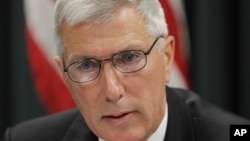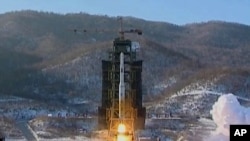PHNOM PENH —
The Chief of the U.S. Pacific Command, Admiral Samuel Locklear, has warned North Korea that any further nuclear tests would only increase the country’s isolation while posing a threat to the regional security environment.
Speaking from Hawaii via a link-up with journalists and academics from around the region, Admiral Locklear says recent statements out of North Korea suggest the country is leaning towards another nuclear test and this would be a significant violation of UN Security Council resolutions.
“[Pyongyang’s] continued focus on its nuclear program and missile program is really not doing anything to help the North Korean people, which I understand need help,” he said.
Some officials in Seoul and Washington say a North Korean nuclear test may be imminent, prompting South Korea to issue its sternest warning yet to Pyongyang saying it risks “very grave consequences” if it proceeds.
“If you look at it from the Asia-Pacific security environment, the activities in North Korea have the potential to be very disruptive to the safety, security environment that I think all of us want, and the international community [must] do all we can to get North Korea to start behaving within the U.N. Security Council resolution requirements,” he said.
Admiral Locklear then urged Asia-Pacific countries reinforce efforts toward a safe and prosperous environment, adding the much talked about Code of Conduct for resolving disputes in the South China Sea would go a long way towards helping nations deal with their differences.
“We’re trying to do all we can to manage the environment to help the security environment so we don’t have a miscalculation that causes us to go in a direction we don’t want to go," he said.
The 10 member countries of the Association of South East Asian Nations (ASEAN) have been unable to reach agreement on a framework for resolving South China Sea territorial disputes. Vietnam, the Philippines, Malaysia and Brunei all have overlapping sovereign claims with China and Taiwan in the disputed sea.
However, negotiations on a code broke down last year with China demanding a deal be struck on a bilateral basis with each country that has staked a territorial claim. ASEAN members split over whether to adopt the bilateral proposal favored by China or a united ASEAN approach as preferred by Vietnam and the Philippines.
Admiral Locklear also urged countries to look past their differences and cooperate in areas of mutual concern, including counterterrorism, anti-piracy, disaster response and sea-lane protection.
Speaking from Hawaii via a link-up with journalists and academics from around the region, Admiral Locklear says recent statements out of North Korea suggest the country is leaning towards another nuclear test and this would be a significant violation of UN Security Council resolutions.
“[Pyongyang’s] continued focus on its nuclear program and missile program is really not doing anything to help the North Korean people, which I understand need help,” he said.
Some officials in Seoul and Washington say a North Korean nuclear test may be imminent, prompting South Korea to issue its sternest warning yet to Pyongyang saying it risks “very grave consequences” if it proceeds.
“If you look at it from the Asia-Pacific security environment, the activities in North Korea have the potential to be very disruptive to the safety, security environment that I think all of us want, and the international community [must] do all we can to get North Korea to start behaving within the U.N. Security Council resolution requirements,” he said.
Admiral Locklear then urged Asia-Pacific countries reinforce efforts toward a safe and prosperous environment, adding the much talked about Code of Conduct for resolving disputes in the South China Sea would go a long way towards helping nations deal with their differences.
“We’re trying to do all we can to manage the environment to help the security environment so we don’t have a miscalculation that causes us to go in a direction we don’t want to go," he said.
The 10 member countries of the Association of South East Asian Nations (ASEAN) have been unable to reach agreement on a framework for resolving South China Sea territorial disputes. Vietnam, the Philippines, Malaysia and Brunei all have overlapping sovereign claims with China and Taiwan in the disputed sea.
However, negotiations on a code broke down last year with China demanding a deal be struck on a bilateral basis with each country that has staked a territorial claim. ASEAN members split over whether to adopt the bilateral proposal favored by China or a united ASEAN approach as preferred by Vietnam and the Philippines.
Admiral Locklear also urged countries to look past their differences and cooperate in areas of mutual concern, including counterterrorism, anti-piracy, disaster response and sea-lane protection.





